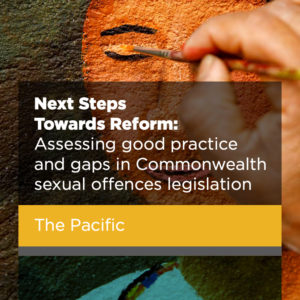Fiji’s sexual offences laws are found in the Crimes Act 2009. The Criminal Procedure Act 2009 contains the rules of evidence which apply to sexual assault offences. Note that these acts were originally issued as government decrees, but obtained the status of acts in 2016 (Revised Edition of the Laws (Consequential Amendments) Act 2016).
Some of the provisions covered by this review meet good practice standards. For example, the CA explicitly criminalises all forms of non-consensual sexual penetration and provides that consent must be freely and voluntarily given by a person with the necessary mental capacity to give the consent. Sexual offences against both adults and children are gender-neutral and consensual same-sex sexual activity is not a crime.
The legislation does not expressly state that marital rape and sexual assault are crimes and that there is no exception for, or defence of marriage in any circumstance. However, in 2016 the Fiji Court of Appeal held that marital rape and sexual assault are crimes in Fiji (Ismail v State [2016] FJCA 136). Better practice would be to amend the Crimes Act to explicitly exclude a marital rape exception.
Other areas of the law partly meet good practice. For example, the legislation does not state that non-penetrative sexual assault includes all acts of sexual touching (e.g. groping) of any part of the body, there are limited child sexual assault provisions and they are not aligned with the general rape and sexual assault provisions. There are limited close-in-age defences for child sexual assaults to prevent criminalising consensual sexual activity between young people where one or both are under the age of consent.
Other areas of the law would need to be reformed to meet good practice fully, including for example: replacing moralistic terminology used to describe sexual assault, such as ‘gross indecency’, ‘indecent assault’, ‘insult[ing] the modesty’ and ‘defilement’; providing that there is no need for evidence of resistance to the assault to prove that sexual activity took place without consent and that consent cannot be inferred from a complainant’s silence or submission during the assault; defining non-penetrative sexual offences more broadly; and not criminalising sex with people with disability regardless of their consent.
The CA uses the term ‘mental sub-normality’ to refer to people with intellectual disability, which is derogatory and stigmatising and not good practice.
Fiji is a state party to relevant international human rights treaties, including the UN Convention on the Elimination of All Forms of Discrimination against Women, Convention on the Rights of the Child, Convention on the Rights of Persons with Disabilities, Convention against Torture and Other Cruel, Inhuman or Degrading Treatment or Punishment and International Covenant on Civil and Political Rights.
The full assessment of Fiji is available here.



